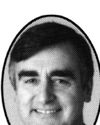Mr. Speaker, March 5 to 11 is "Save your vision week" in Canada. This is an annual event to foster public awareness sponsored by the Canadian Association of Optometrists.
This year's theme is: "Hope is in sight. Good vision and literacy: There is a clear connection".
Many Canadians are unable to read simply because they do not see well. Children do not learn to read if they cannot focus on the blackboard or on the words in a book. One child in six has a vision problem, which makes it hard for him or her to learn and to read. The key is prevention. Early detection of vision problems really helps improve literacy. It has been established that three quarters of adults with literacy problems also have vision problems.
I join, therefore, with the 2,800 optometrists in Canada to remind Canadians that good vision is a must for good reading.















